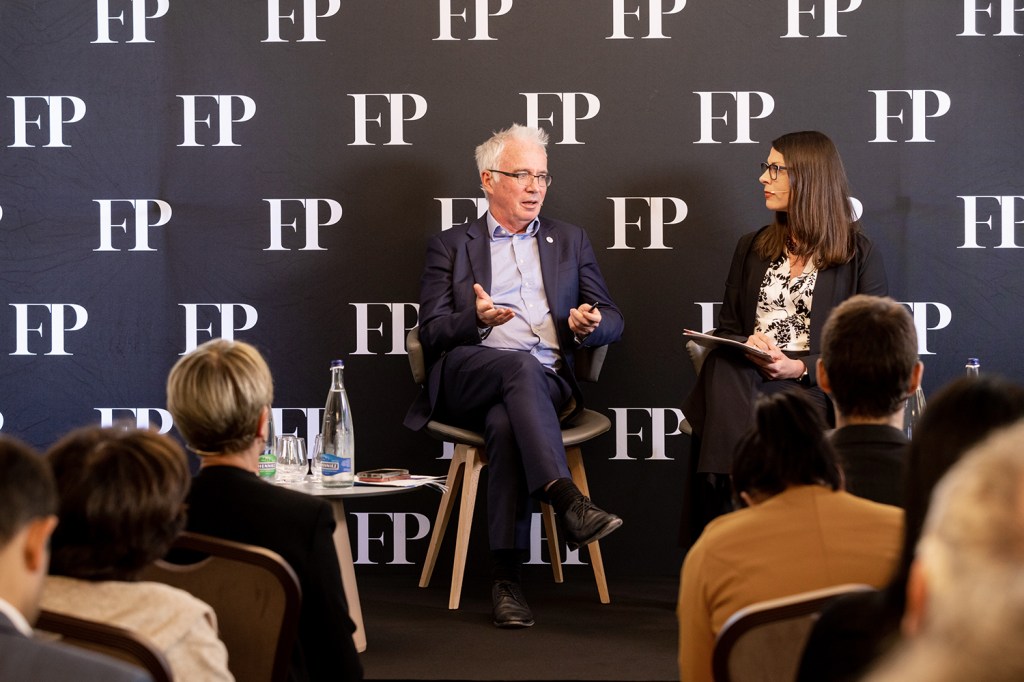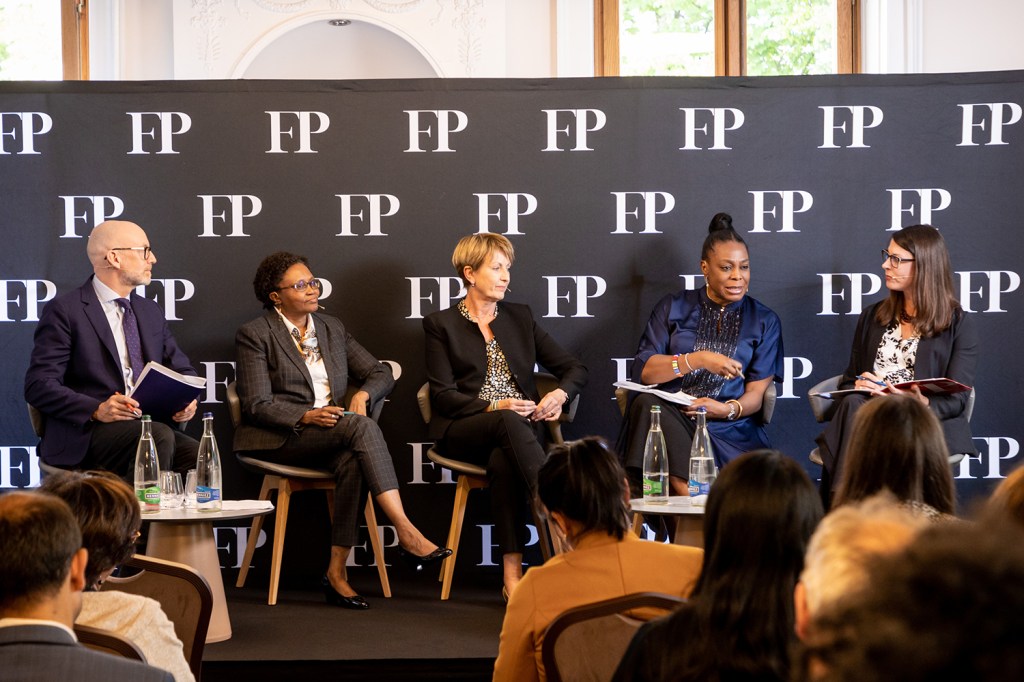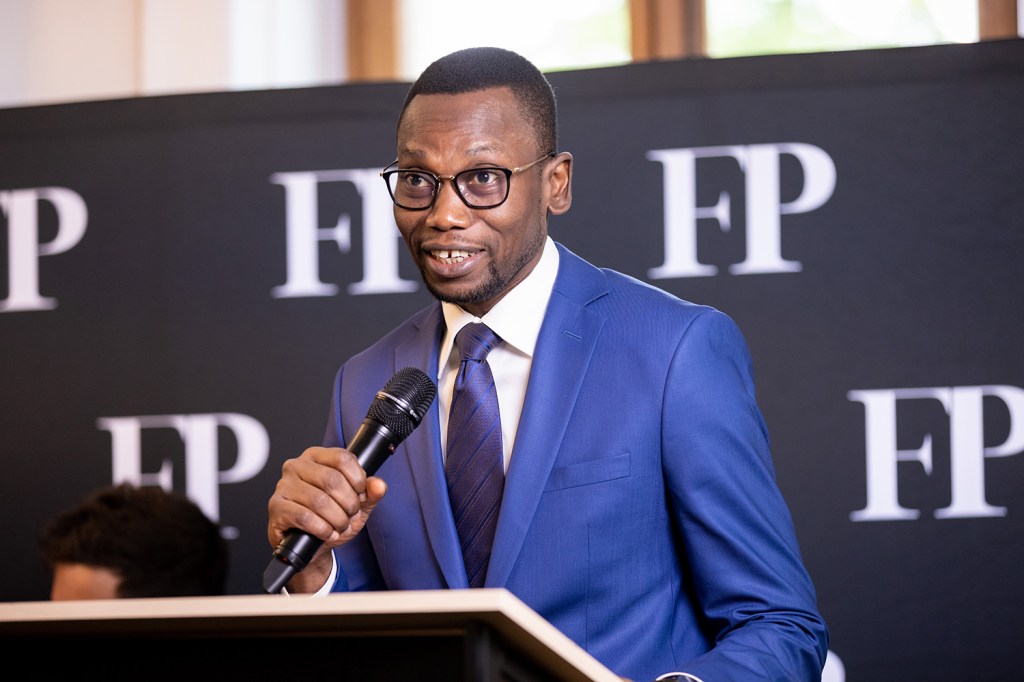A synthesis report produced by FP Analytics, with support from Roche
July 2023
A 2021 report by the Lancet Commission on Diagnostics found that nearly half the global population lacks access to timely and accurate diagnostics, over 80 percent of whom live in lower- and middle-income countries (LMICs). Widely available, low-cost, accurate diagnostic testing can facilitate the prevention and rapid treatment of communicable and non-communicable diseases (NCDs), creating stronger health care systems and a healthier global population, while reducing the economic impacts of ill health. In May 2023, delegates of the World Health Assembly (WHA) debated a resolution to strengthen diagnostic capacities, brought to the Assembly by Eswatini, and supported by a coalition of countries. Against this backdrop, on May 24, 2023, FP partnered with Roche to hold a public briefing in Geneva, Switzerland, alongside the WHA to elevate awareness and inform stakeholders about the relevance and import of the resolution, which was later approved. The event brought together representatives from government, multilateral institutions, philanthropy, and the private sector to discuss the barriers to and impacts of expanded access to diagnostics. The first in a series of multistakeholder convenings planned for 2023 dedicated to this issue, “Prioritizing Diagnostics on the Global Agenda” explored practical, collaborative, and impactful actions to close the diagnostic access gap, particularly in LMICs. Key takeaways and learnings from the expert conversations included:
- Expanding diagnostics capacity and quality can strengthen global health systems, increase pandemic preparedness, and reduce non-communicable disease burdens.
- Diagnostics are key to preventive health care in resource-scarce regions, but sustainable funding for labs and inputs remains a challenge.
- Improved diagnostics will be most effective when combined with investments in the health care labor force, and in other public services like broadband internet and telecoms access.
- Multistakeholder partnerships established or grown in response to the COVID-19 pandemic are well-placed to deploy their expertise, resources, and relationships to pursue the goal of accessible, high-quality diagnostics.
- Looking ahead, it will be imperative for countries to articulate national plans to invest in diagnostics, starting at September’s UN General Assembly.
Headline Conversation

Peter Sands, Executive Director, The Global Fund
Allison Carlson, Executive Vice President, FP Analytics & Events
The event opened with a candid conversation with Peter Sands, who reflected on lessons learned through The Global Fund’s work to address HIV/AIDS, tuberculosis (TB), malaria, and COVID-19 in LMICs. Sands outlined the scope of the diagnostics challenge: there are around 1.1 million avoidable deaths per year due to misdiagnosis or lack of diagnosis, and this number is likely underestimated. In particular, he emphasized the potential health impacts of tests that are simple, cheap to produce, and—where possible—self-administered, citing successes in expanding access to malaria and HIV/AIDS testing in both understanding the scope of the disease burden and moving toward effective treatment. Expanding diagnostics capacity can also contribute to rapid and effective response to future health crises and epidemics. The Global Fund was a major supplier of tests and treatments to LMICs during the COVID-19 pandemic, through its COVID-19 Response Mechanism (C19RM) and was able to rapidly deploy testing kits and process results due to lab and transportation infrastructure established in previous years to address TB, HIV/AIDS, and malaria. Learning from this experience, Sands advised that “when we’re thinking about diagnostics and pandemic preparedness, we have to think that what we do for the diseases we face right now is the foundation for what we will have when encountering new threats.”
Throughout the event, speakers reflected on the challenge of sustainable financing for diagnostics. Sands noted that diagnostics are a key priority in resource-constrained contexts, as they facilitate the identification of areas of greatest burden and need, and thus enable public and private health care providers to deploy resources strategically. In support of this goal, he suggested, research and development to enable screening for multiple conditions in one test—at low cost—could increase the efficiency and impact of funding allocations.
The conversation closed with a call for greater partnership between stakeholders in global health. As Sands stated, “Time is lives, and we’re often too slow,” but partnerships can help to bring together the necessary resources, expertise, and access to accelerate the process of diagnosing and treating disease.
Panel Discussion

Michael Kent Ranson, Senior Health Economist, The World Bank Group
Dr Lindiwe Makubalo, Assistant Regional Director, African Region, WHO
Ann Costello, President, Roche Diagnostics Solutions
Dr Ayoade Alakija, Special Envoy for the Access to COVID-19 Tools Accelerator (ACT-Accelerator), WHO
Allison Carlson, Executive Vice President, FP Analytics & Events
The subsequent panel discussion brought together representatives from Roche, the World Bank, the World Health Organisation (WHO), and the ACT-Accelerator for a panel discussion on what is needed to expand access to diagnostic tools at the regional, national, and community levels. Much of the conversation centered around the identification and deployment of sustainable financing models and funding that can flow to governments from the private sector and multilateral development banks. However, panelists cautioned against over-reliance on philanthropy and foreign aid: Dr. Ayoade Alakija, Special Envoy to the WHO for ACT-Accelerator, noted that government investment is key to resilient health systems, particularly investment in basic infrastructure and services such as electricity, water, and broadband that enable the operation of testing and treatment equipment. Extending utilities to rural and remote areas can therefore improve access to diagnostics and thus improve health outcomes for those communities.
Expanding on this point, Ann Costello, President of Roche Diagnostic Solutions, noted that public-private partnerships (PPPs) can extend capacity and multiply the effects of investments by combining the resources and expertise of different stakeholders. These can include partnerships to improve the capacity and ability of diagnostics labs by providing technical expertise to implement efficient processes, training lab technicians, and building the infrastructure for test transportation and communication of results. Echoing the WHA resolution, Ms. Costello called for integrated diagnostics that support and improve primary health care, including in remote and rural areas. As Ms. Costello emphasized, access to diagnostics is about ensuring quality and accuracy: “At the end of the day, you’re dealing with patients’ lives. We can’t afford to make a mistake.”
Michael Kent Ranson, Senior Health Economist for the World Bank, discussed World Bank-led multistakeholder initiatives such as the Global Financing Facility for Women, Children, and Adolescents and the Health in Africa fund. The latter, a private equity fund in partnership with the Gates Foundation, has invested over half a billion dollars in small- and medium-sized African health enterprises since its inception in 2009, a critical intervention on a continent where over half of medical services are delivered by the private sector. The success of these initiatives, as Dr. Alakija noted, is dependent on understanding exactly what local communities want and need from their health services, engaging with local organizations, and the deployment of widespread, frequent diagnostics to better understand disease burdens and pressure points.
Panelists frequently spoke against siloes in the health care industry, noting that while extremely specific interventions can be impactful, there are many investments to be made that can contribute to more than one health goal. For example, rapid and reliable diagnostics require the presence of a fully resourced and well-trained health care workforce, as do effective primary health care (PHC) services, and emergency response. The 2021 Lancet Commission on Diagnostics reported a shortfall of around 840,000 health care workers globally that must be filled to expand access to diagnostics, but filling this labor force gap will additionally strengthen and sustain health systems more broadly. As Dr. Lindiwe Makubalo, Assistant Regional Director for the African Region at the WHO, noted, health systems can achieve tangible results by analyzing how best to spend resources, and then partnering with other organizations to deploy creative solutions to maximize impact.
Closing Address

Benjamin Ignace Bondunrin Hounkpatkin, Minister of Health, Benin
Concluding the event, the Health Minister of Benin, Benjamin Ignace Bondunrin Hounkpatkin, spoke about the country’s experience with COVID-19 and identified clear steps to improve diagnostic capabilities and health system resilience in the future. As the Minister noted, intercontinental travel and the rapid spread of pathogens mean that equitable access to diagnostics and therapeutics in even the poorest countries is a matter of global health security. However, current barriers to access in LMICs are significant, including the concentration of research and development, technology, and manufacturing capabilities in industrialized countries, and the high cost of implementing and sustaining infrastructure for the transport and storage of inputs such as testing reagents.
While Benin’s first case of COVID-19 was detected in March 2020, diagnostics were scarce, and local testing labs were ill-equipped to deal with the rapidly increasing burden of the disease. As a result of government partnership with the World Bank and The Global Fund, among others, the country now has improved lab capabilities and technology that have already proven their worth in addressing the subsequent monkeypox outbreak, but sustaining the supply of inputs and equipment, and continuing skills training for health care employees, will be key to maintaining this level of health resilience. Access to diagnostics in LMICs is therefore, as the minister stated, “a critical issue for improving the quality of care and responding effectively to epidemics…and remains a moral and equity issue.”
Looking to the future, the minister recommended that his government, and other LMICs, develop PPPs for health services, and to strengthen the technical ability of new and existing labs, including through the provision of state-of-the-art equipment, wider access to inputs, and regular specialized training for lab technicians. Closing the event, the minister issued a call to action, saying, “It is only by working together that we can meet the challenge of creating a safer world for all, leaving no one behind. It is not only a dream, it can come true.”
Looking Ahead
High-quality, affordable diagnostics have an integral role to play in improving global health outcomes and supporting sustainable development. The resolution adopted last May has the potential to be a crucial building block in expanding access to diagnostics and, by extension, achieving universal health coverage. Concretely, the resolution puts forward a range of recommendations and calls to actions to Member States, from establishing national diagnostics strategies and developing capabilities of the healthcare workforce to adopting regulatory frameworks that accelerate access. This multistakeholder process can be informed by and draw upon the insights of the leaders who shared their perspectives at the “Prioritizing Diagnostics on the Global Agenda” event. Ministers of health and finance, private health care companies, civil society organizations, and multilateral institutions all have roles to play in generating policies, developing innovative solutions, facilitating investments, and improving access to accurate diagnostics in the poorest and most remote regions. Doing so will be crucial to implementing the goals of the resolution.
By Isabel Schmidt (Senior Research and Policy Analyst) and Allison Carlson (Executive Vice President, FP Analytics & Events). This synthesis report was produced by FP Analytics, the independent research division of The FP Group, with support from Roche. FP Analytics retained control of this report. Foreign Policy’s editorial team was not involved in the creation of this content.

